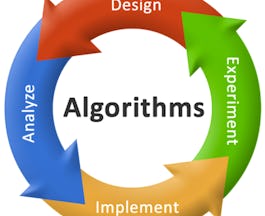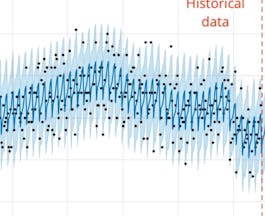Filter by
The language used throughout the course, in both instruction and assessments.
333 results for "probability theory"

Duke University
Skills you'll gain: Basic Descriptive Statistics, Data Analysis, General Statistics, Probability & Statistics, Statistical Analysis, Critical Thinking, R Programming, Exploratory Data Analysis, Statistical Programming, Statistical Visualization, Computer Programming

University of Geneva
Skills you'll gain: Correlation And Dependence, Finance, Investment Management, Leadership and Management, Market Analysis, Risk Management, Financial Analysis, Financial Management, Probability & Statistics, Statistical Analysis

Stanford University
Skills you'll gain: Algorithms, Theoretical Computer Science, Computational Thinking, Computer Programming, Critical Thinking, Mathematics, Problem Solving, Computational Logic, Mathematical Theory & Analysis, Programming Principles

Coursera Project Network
Skills you'll gain: Forecasting

University of Colorado Boulder

University of Colorado Boulder
Skills you'll gain: Probability & Statistics, General Statistics, Probability Distribution, Machine Learning, Statistical Analysis, Statistical Tests, Regression, Statistical Machine Learning, Machine Learning Algorithms, Python Programming, Estimation, Statistical Programming, Correlation And Dependence, Data Analysis, Applied Machine Learning, Mathematics, Calculus, Experiment, Deep Learning, Dimensionality Reduction, Data Mining, Linear Algebra, Algorithms, Data Science, Data Warehousing, R Programming

Imperial College London

University of Illinois at Urbana-Champaign
Skills you'll gain: Accounting, Leadership and Management, Financial Accounting, Financial Analysis, Finance, Strategy, Business Analysis, Financial Management, General Accounting, Marketing, Strategy and Operations, Critical Thinking, Data Analysis, Generally Accepted Accounting Principles (GAAP), Decision Making, Market Analysis, Management Accounting, Taxes, Investment Management, Risk Management, Entrepreneurship, Mergers & Acquisitions, Cost Accounting, Account Management, Market Research, Media Strategy & Planning, Communication, Accounts Payable and Receivable, Regulations and Compliance, Statistical Programming, Probability & Statistics, Audit, Corporate Accouting, Problem Solving, Banking, Business Development, Business Process Management, Business Transformation, Cash Management, Planning, Python Programming, Digital Marketing, Performance Management, Product Strategy, Brand Management, Exploratory Data Analysis, Leadership Development, Marketing Management, Sales, Machine Learning, Statistical Analysis, Business Design, Innovation, Securities Trading, Data Visualization, R Programming, Correlation And Dependence, General Statistics, Organizational Development, Product Management, Business Intelligence, Data Analysis Software, Research and Design, Social Media, Project Management, Customer Analysis, Data Management, Operational Analysis, People Management, Regression, Statistical Machine Learning, Advertising, Basic Descriptive Statistics, Behavioral Economics, Budget Management, Business Communication, Conflict Management, Interactive Data Visualization, Benefits, Business Psychology, Change Management, Culture, Customer Relationship Management, Design and Product, Operations Management, Plot (Graphics), Statistical Tests, Algorithms, Computer Programming, Human Resources, Influencing, Probability Distribution, Machine Learning Algorithms, Business Research, Collaboration, Data Model, Marketing Design, Extract, Transform, Load, Negotiation, Data Mining, Data Visualization Software, Securities Sales, Visualization (Computer Graphics), Systems Design, Visual Design, Entrepreneurial Finance, Forecasting, Game Theory, Supply Chain and Logistics, Accounting Software, Databases, Econometrics, Natural Language Processing, Storytelling, SQL, Theoretical Computer Science, BlockChain, Data Architecture, Microsoft Excel

University of Illinois at Urbana-Champaign
Skills you'll gain: Leadership and Management, Accounting, Financial Accounting, Finance, Financial Analysis, Business Analysis, Strategy, Marketing, Financial Management, Critical Thinking, Decision Making, Strategy and Operations, Data Analysis, General Accounting, Market Analysis, Generally Accepted Accounting Principles (GAAP), Taxes, Entrepreneurship, Management Accounting, Market Research, Investment Management, Communication, Risk Management, Mergers & Acquisitions, Problem Solving, Regulations and Compliance, Cost Accounting, Digital Marketing, Account Management, Accounts Payable and Receivable, Business Development, Corporate Accouting, Marketing Management, Media Strategy & Planning, Business Process Management, Business Psychology, Data Management, Exploratory Data Analysis, Statistical Programming, Probability & Statistics, Data Visualization, Culture, Leadership Development, Audit, Innovation, Planning, Business Transformation, Product Strategy, Research and Design, Banking, Performance Management, Securities Trading, Brand Management, Business Intelligence, Cash Management, Customer Analysis, Python Programming, Sales, Statistical Analysis, Organizational Development, People Analysis, Behavioral Economics, Business Communication, Creativity, Product Management, Data Analysis Software, Human Learning, Machine Learning, Social Media, Business Design, Advertising, Customer Relationship Management, Process Analysis, Professional Development, R Programming, Correlation And Dependence, Design and Product, General Statistics, Influencing, People Management, Interactive Data Visualization, Change Management, Conflict Management, Marketing Design, Operational Analysis, Project Management, Advertising Sales, Basic Descriptive Statistics, Collaboration, Emotional Intelligence, Human Resources, Regression, Statistical Machine Learning, Negotiation, Benefits, Big Data, Budget Management, Data Model, Operations Management, Plot (Graphics), Product Design, Data Visualization Software, Probability Distribution, Statistical Tests, Storytelling, Algorithms, Computer Programming, Data Mining, Employee Relations, Product Lifecycle, Securities Sales, Business Research, Machine Learning Algorithms, Visualization (Computer Graphics), Contract Management, Extract, Transform, Load, Supply Chain and Logistics, Databases, Entrepreneurial Finance, Forecasting, Game Theory, Visual Design, Systems Design, Accounting Software, Econometrics, Natural Language Processing, SQL, Theoretical Computer Science, BlockChain, Data Architecture, Microsoft Excel

University of Illinois at Urbana-Champaign
Skills you'll gain: Leadership and Management, Accounting, Finance, Financial Analysis, Financial Accounting, Business Analysis, Strategy, Data Analysis, Decision Making, Critical Thinking, Marketing, Financial Management, Strategy and Operations, Market Analysis, General Accounting, Taxes, Entrepreneurship, Generally Accepted Accounting Principles (GAAP), Investment Management, Management Accounting, Market Research, Regulations and Compliance, Communication, Mergers & Acquisitions, Risk Management, Problem Solving, Cost Accounting, Probability & Statistics, Corporate Accouting, Digital Marketing, Business Development, Data Management, Account Management, Business Process Management, Accounts Payable and Receivable, Python Programming, Media Strategy & Planning, Exploratory Data Analysis, Marketing Management, Statistical Programming, Business Intelligence, Business Psychology, Behavioral Economics, Leadership Development, Data Visualization, Securities Trading, Culture, Innovation, Audit, Business Transformation, Planning, Statistical Analysis, Banking, Business Communication, Customer Analysis, General Statistics, Organizational Development, Product Strategy, Research and Design, Sales, Performance Management, Professional Development, Brand Management, Cash Management, People Analysis, Product Management, R Programming, Correlation And Dependence, Creativity, Customer Relationship Management, Data Analysis Software, Human Learning, Machine Learning, Advertising, Process Analysis, Social Media, Business Design, Negotiation, Design and Product, Influencing, Regression, Econometrics, Human Resources, Interactive Data Visualization, Change Management, Conflict Management, Marketing Design, Operational Analysis, People Management, Advertising Sales, Budget Management, Statistical Machine Learning, Contract Management, Project Management, Basic Descriptive Statistics, Benefits, Big Data, Collaboration, Computer Programming, Emotional Intelligence, Employee Relations, Forecasting, Operations Management, Plot (Graphics), Probability Distribution, Securities Sales, Data Model, Product Design, Algorithms, Data Structures, Data Visualization Software, Statistical Tests, Storytelling, Data Mining, Mathematics, Product Lifecycle, Visualization (Computer Graphics), Machine Learning Algorithms, Business Research, Supply Chain and Logistics, Extract, Transform, Load, Visual Design, Systems Design, Databases, Entrepreneurial Finance, Game Theory, Accounting Software, Natural Language Processing, SQL, Theoretical Computer Science, BlockChain, Data Architecture, Microsoft Excel

University of Illinois at Urbana-Champaign
Skills you'll gain: Leadership and Management, Accounting, Finance, Financial Analysis, Financial Accounting, Business Analysis, Data Analysis, Strategy, Decision Making, Critical Thinking, Financial Management, Marketing, Strategy and Operations, Market Analysis, General Accounting, Taxes, Generally Accepted Accounting Principles (GAAP), Entrepreneurship, Investment Management, Management Accounting, Market Research, Communication, Risk Management, Mergers & Acquisitions, Problem Solving, Regulations and Compliance, Cost Accounting, Probability & Statistics, Data Management, Account Management, Digital Marketing, Business Development, Accounts Payable and Receivable, Corporate Accouting, Exploratory Data Analysis, Marketing Management, Statistical Programming, Business Process Management, Business Psychology, Media Strategy & Planning, Business Intelligence, Behavioral Economics, Culture, Data Visualization, Leadership Development, Audit, Business Transformation, Innovation, Planning, Statistical Analysis, Product Strategy, Research and Design, Banking, Customer Analysis, General Statistics, Organizational Development, Performance Management, Brand Management, Cash Management, Python Programming, Sales, Securities Trading, Business Communication, People Analysis, R Programming, Correlation And Dependence, Creativity, Data Analysis Software, Machine Learning, Product Management, Human Learning, Professional Development, Social Media, Advertising, Business Design, Customer Relationship Management, Process Analysis, Design and Product, Influencing, Regression, Operational Analysis, People Management, Econometrics, Interactive Data Visualization, Budget Management, Change Management, Conflict Management, Marketing Design, Statistical Machine Learning, Project Management, Advertising Sales, Basic Descriptive Statistics, Big Data, Collaboration, Emotional Intelligence, Forecasting, Human Resources, Operations Management, Plot (Graphics), Probability Distribution, Benefits, Data Model, Product Design, Negotiation, Algorithms, Data Structures, Data Visualization Software, Statistical Tests, Storytelling, Computer Programming, Data Mining, Employee Relations, Product Lifecycle, Securities Sales, Visualization (Computer Graphics), Business Research, Machine Learning Algorithms, Supply Chain and Logistics, Contract Management, Extract, Transform, Load, Visual Design, Databases, Entrepreneurial Finance, Game Theory, Systems Design, Accounting Software, Natural Language Processing, SQL, Theoretical Computer Science, BlockChain, Data Architecture, Microsoft Excel

University of Colorado Boulder
Skills you'll gain: Algorithms, Leadership and Management, Mathematics, Probability & Statistics, General Statistics, Problem Solving, Theoretical Computer Science, Computer Programming, Communication, Databases, Critical Thinking, Data Structures, Data Management, Estimation, Finance, Data Analysis, Design and Product, Research and Design, Systems Design, Mathematical Theory & Analysis, Database Design, Hardware Design, Writing, Data Model, Project Management, Strategy and Operations, Machine Learning, Probability Distribution, SQL, Computational Logic, Decision Making, Strategy, Database Theory, Database Administration, PostgreSQL, Computer Architecture, Operating Systems, Computational Thinking, Computer Programming Tools, Graph Theory, Planning, Process Analysis, Statistical Tests, Internet Of Things, Correlation And Dependence, Database Application, Financial Analysis, Statistical Analysis, Algebra, Business Communication, Machine Learning Algorithms, Product Management, Regression, Agile Software Development, Business Analysis, Data Visualization, Product Design, Professional Development, Statistical Machine Learning, Computer Networking, Accounting, Business Process Management, Cost Accounting, Creativity, Linear Algebra, Python Programming, Material Handling, People Management, Programming Principles, Statistical Programming, System Programming, Deep Learning, Calculus, Investment Management, Organizational Development, Risk Management, Business Design, Entrepreneurship, Experiment, Performance Management, Product Development, Scrum (Software Development), System Security, Computer Vision, Network Architecture, Business Intelligence, Differential Equations, Financial Accounting, Network Security, Product Lifecycle, System Software, Visual Design, Cloud Computing, Microarchitecture, Financial Management, Graphic Design, Security Engineering, Applied Machine Learning, Big Data, Collaboration, Conflict Management, Distributed Computing Architecture, Innovation, Market Analysis, Marketing, Software Engineering, Software Security, Software Testing, Amazon Web Services, Cloud Applications, Cloud Platforms, Cloud Standards, Security Strategy, Adaptability, Applied Mathematics, Budget Management, Leadership Development, Linux, Network Analysis, Operations Management, Market Research, NoSQL, Data Mining, Negotiation, Product Strategy, R Programming, Software Architecture, Dimensionality Reduction, Forecasting, Kubernetes, Business, Computer Science, Data Science, Data Warehousing, Resilience
Searches related to probability theory
In summary, here are 10 of our most popular probability theory courses
- Introduction to Probability and Data with R: Duke University
- Portfolio and Risk Management: University of Geneva
- Divide and Conquer, Sorting and Searching, and Randomized Algorithms: Stanford University
- Intro to Time Series Analysis in R: Coursera Project Network
- Introduction to Generative AI: University of Colorado Boulder
- Data Science Graduate Certificate: University of Colorado Boulder
- Master of Science in Machine Learning and Data Science: Imperial College London
- Graduate Certificate in Taxation: University of Illinois at Urbana-Champaign
- Master of Science in Management: University of Illinois at Urbana-Champaign
- Master of Science in Accounting: University of Illinois at Urbana-Champaign










